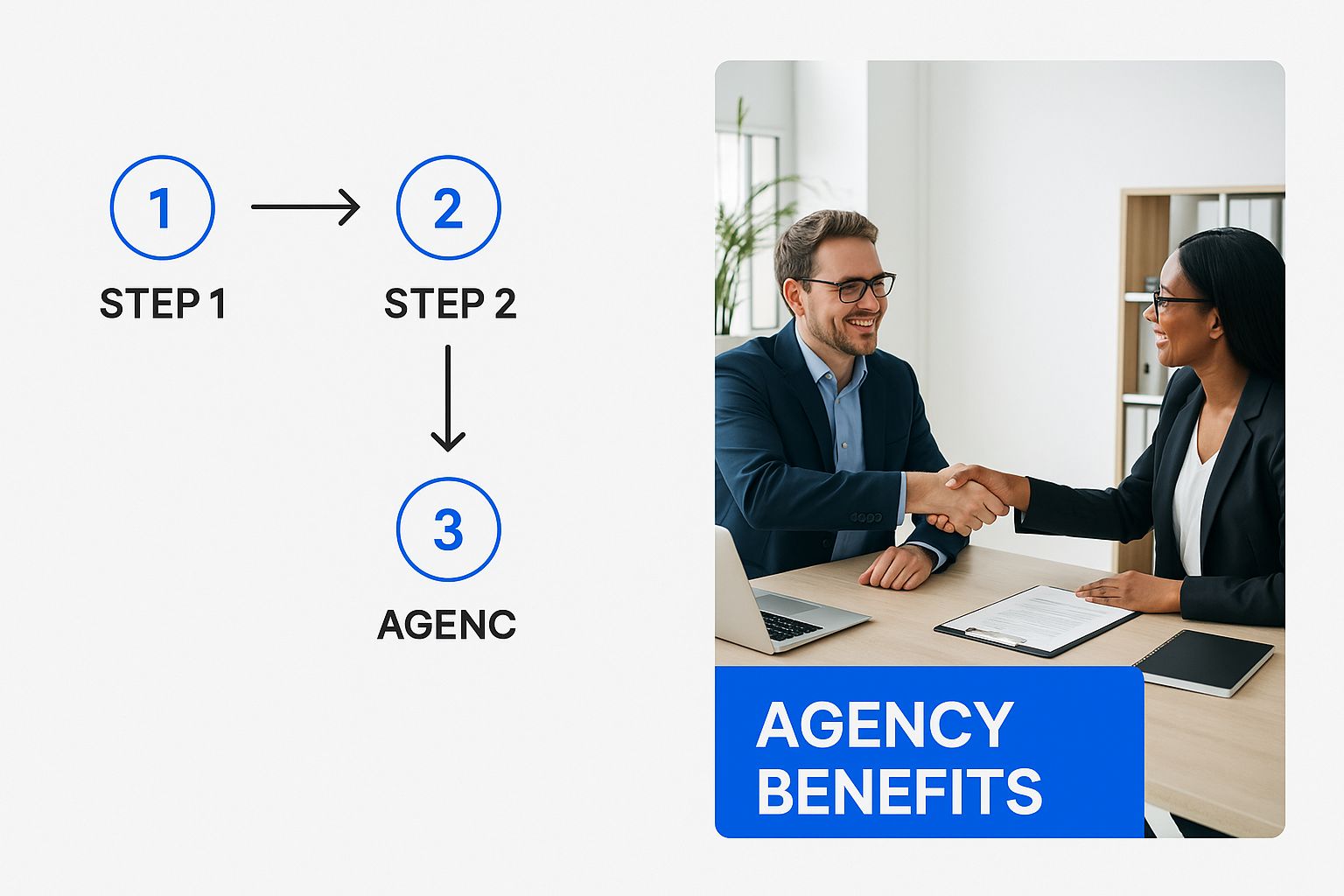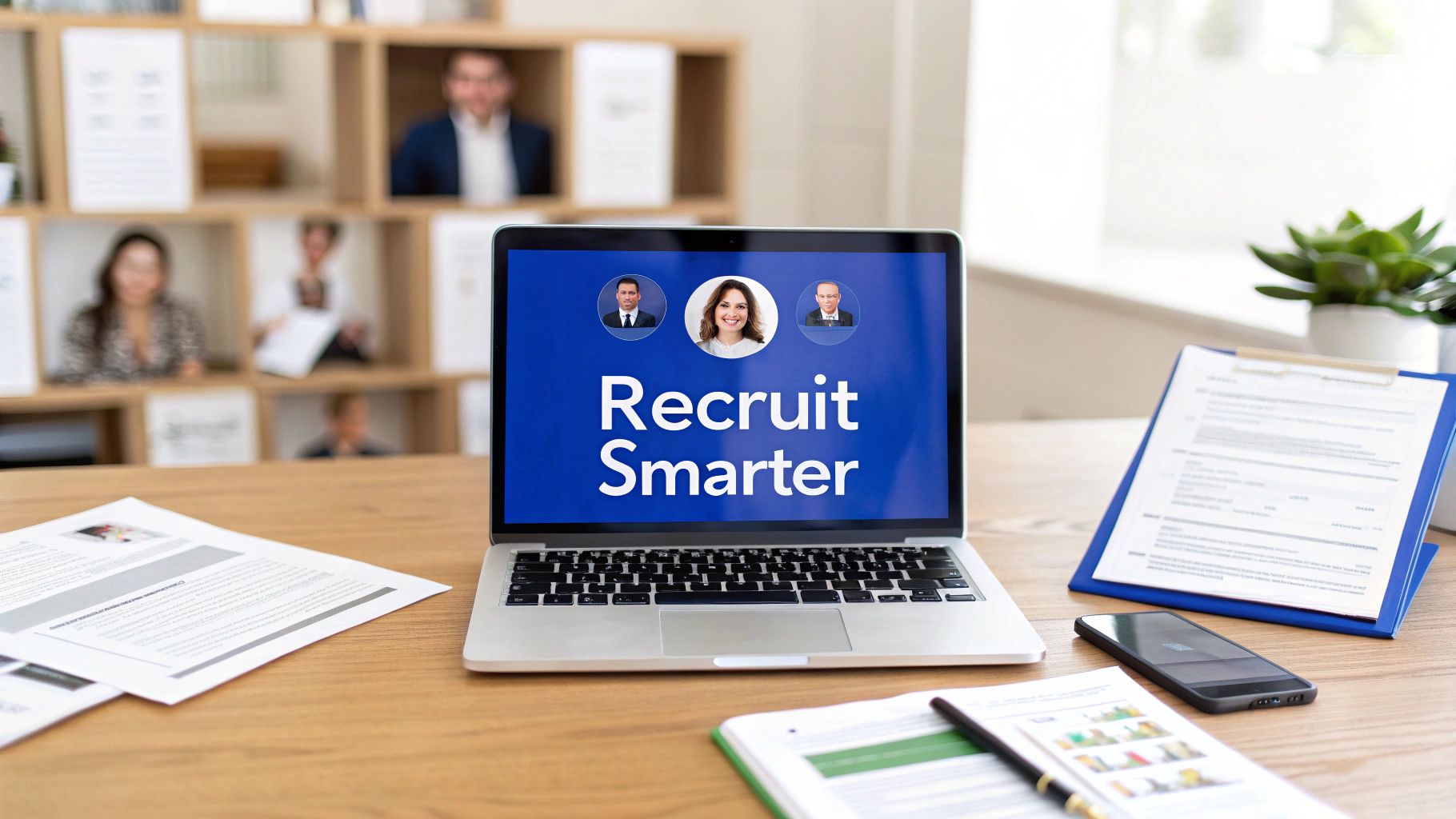Before you even think about picking up the phone to a recruiter, the real work needs to happen in-house. A successful partnership with a recruitment agency is built on a solid foundation, and that foundation is all about you knowing exactly what you need. This means looking beyond a basic job description and really digging into your company's employer branding to attract the right people.
Building a Foundation for Agency Success
Rushing to engage an agency without doing your homework is a recipe for wasted time and frustration. Taking the time to plan upfront is what prevents the all-too-common miscommunications that can completely derail a search. When you finally do brief your chosen agency, you'll be handing them a precise, well-thought-out plan that gives them the best possible chance of finding your perfect hire.
Think about it: in the UK, a staggering 59% of businesses rely on recruitment agencies to find great staff. These partnerships are clearly vital. But the stakes are high. A bad hire, especially at a management level, can cost a business upwards of £132,000. With the average time-to-fill a role sitting at 42 days, an effective agency can dramatically speed things up by leveraging their existing networks. Your internal preparation is what makes sure you get the maximum return on that investment.
Define the Role Beyond a Job Description
Let's be honest, a simple list of duties isn't going to cut it. You need to create a "role profile" that tells the full story. What is the core problem this person is being hired to solve?
Instead of saying you need a 'Marketing Manager', get specific. Are you hiring them to increase qualified leads by 30% in the next two quarters? Or is their main goal to build a brand-new content marketing engine from the ground up? This kind of context is pure gold for a recruiter.

As the image suggests, a strong partnership is built on clear communication and shared goals, which ultimately leads to better, faster hiring outcomes.
The most common mistake I see companies make is handing an agency a generic job description and expecting a superstar candidate to magically appear. Your brief is your first—and most important—tool for success.
Clarify Your True Budget
When you think about your budget, you need to see the whole picture, not just the salary. The agency's fee, typically a percentage of the annual salary, is a key part of the equation. Be completely transparent about the entire compensation package.
This should include:
- Base Salary Range: Give them a realistic minimum and maximum. Don't play games here; it wastes everyone's time.
- Performance Bonus: Is it guaranteed, or is it based on hitting specific targets? Be clear.
- Benefits: What else is on offer? Make sure to mention pension contributions, private health insurance, remote work stipends, and any other perks.
Align Your Internal Team
I can't stress this enough: nothing kills momentum in a hiring process faster than a team that isn't on the same page. Before you even speak to an agency, get everyone who will be involved in the hiring process in a room (or on a call) and get aligned.
Who has the final say? What are the absolute must-haves versus the nice-to-haves? What will the interview process look like, step by step? Answering these questions upfront prevents you from sending mixed signals to your agency and, more importantly, to the candidates you’re trying to impress. A unified front looks professional and makes your company a far more attractive place to work.
To make this easier, here’s a quick checklist to run through before you start your search.
Agency Partnership Preparation Checklist
This checklist covers the essential steps to ensure you're fully prepared before you engage with a recruitment partner.
Completing these actions will put you in a strong position, ensuring your partnership with a recruitment agency gets off to the best possible start.
Choosing the Right Recruitment Partner
Let's be honest, not all recruitment agencies are built the same. Picking the right one can be the difference between a hiring triumph and a costly, frustrating exercise. You're not just buying a service; you're finding a partner whose performance will directly shape your team.
The first fork in the road is deciding between a generalist and a specialist agency. It's a crucial distinction.
Specialist Versus Generalist Recruiters
Think about it this way: if you need to hire an administrative assistant, a good generalist agency probably has a wide net and a pool of great candidates ready to go. But what if you're looking for something very specific, like a 'Senior Salesforce Developer with Financial Services Cloud experience'?
A generalist will be starting their search from a blank slate. A specialist in that tech space, however, already knows the landscape. They know the key players, what they're currently earning, and—most importantly—how to reach the passive talent who aren't even actively looking for a new job. That’s where the real gold is.
For any complex or senior hire, a specialist recruiter’s insight is worth its weight in gold. They genuinely understand the nuances of the role and can vet candidates with a level of detail you just won't get elsewhere. This saves you the headache of wading through a pile of irrelevant CVs. The rule of thumb is simple: match the agency’s expertise to the role’s complexity.
Vetting an Agency's Track Record and Reputation
Once you’ve decided whether you need a specialist or a generalist, it's time to do your homework. Don't just be won over by a slick website. You need to dig in and verify their credibility. A truly great agency will be proud of its track record and transparent about its results.
So, what should you ask for?
- Case Studies or Testimonials: Look for proof they've successfully placed people in roles similar to yours, both in industry and seniority.
- References: Don't be shy. Ask if you can speak with one or two of their recent clients. An agency that's confident in its work will have no problem with this.
- Online Reviews: Check out Google, professional networks, and industry forums for real, unfiltered feedback from other companies.
A key takeaway here is that the best partnerships are built on trust and proven results. Never hesitate to ask the tough questions about an agency's actual experience before you sign anything.
The UK recruitment market is incredibly competitive. Agencies are constantly proving their worth against in-house teams and new tech platforms. Because of this pressure, the best firms invest heavily in their own technology and deep-seated knowledge to offer strategic advice, not just a list of names.
Understanding Fees and Cultural Fit
Finally, let's talk about the practicalities: money and culture. You need to get crystal clear on the commercial side of things right from the start.
Ask about their fee structure. Is it contingent, where you only pay upon a successful hire? Or is it retained, where you pay an upfront fee to secure their dedicated time and resources for your search? Each model has its place, so make sure you understand what you're signing up for.
Just as important is the cultural fit. Do their values and communication style click with yours? This isn't a one-off transaction; a relationship with a recruitment agency can last for years and fundamentally influence the makeup of your team.
For companies seeking a more embedded, long-term solution, it's worth exploring different models. To learn more about how a deeper collaboration could work for you, check out our guide on finding top recruitment process outsourcing companies.
How to Write a Brief That Actually Attracts Top Talent
If you give a recruiter a vague, uninspired job description, guess what you'll get back? Vague, uninspired applicants. It’s a simple truth many hiring managers learn the hard way. The quality of candidates an agency sends your way is a direct mirror of the quality of the brief you provide.
Think of your recruitment brief as your number one sales tool. You're not just listing tasks; you're arming the recruiter with a compelling story to tell. Their job is to sell this opportunity to high-calibre professionals, many of whom aren't even looking for a new job. Your brief needs to give them the ammunition to do that effectively.

Go Beyond a Boring List of Duties
Top performers aren't motivated by a list of responsibilities; they're driven by impact. So, instead of just listing duties, get specific about the real problems this new hire will solve. What are the big challenges they'll tackle in their first six months? What does a massive win look like a year from now?
Let's take a remote Financial Analyst role. A standard brief might say, "prepare monthly reports." That’s a snoozefest.
A much better brief would frame it like this: "This analyst will get to overhaul our clunky, manual reporting process. The goal is to implement a new system that cuts reporting time by 40% and gives our leadership team the real-time data they desperately need." See the difference? One is a task; the other is a mission.
The best briefs I’ve ever seen read less like a job spec and more like a business case. They paint a vivid picture of the opportunity and the impact the new hire will have on the company's future. This is what gets top performers excited.
Paint a Picture of Your Culture and Team
Great candidates don't just join companies; they join people. Your recruiter needs to understand the human side of the role to find the right fit. Who will this person work with every day? What’s the team dynamic like? Are we talking daily stand-ups and constant collaboration, or is it a more heads-down, autonomous environment?
Make sure to include a few notes on:
- The Manager: A quick line about their leadership style and what they look for in a team member goes a long way.
- The Team: How big is the team? What’s the general vibe or mix of roles?
- Company Values: What are the non-negotiable principles that guide your business? This is key for finding someone who will stick around.
A brief that covers these points turns an external recruiter into a true extension of your team. They can speak with real conviction about why your company is a fantastic place to build a career.
Set Crystal-Clear Expectations for the Hiring Process
Finally, your brief needs to be a practical roadmap for the hiring process itself. This is where things often fall apart. Getting the logistics right from the start avoids frustration and stops you from losing great people to a competitor.
Be upfront about the entire journey:
- Interview Stages: Lay out every single step. For instance: a 30-minute screening call, a 45-minute technical interview with the hiring manager, and a final 60-minute culture chat with the team. No surprises.
- Key Stakeholders: Who will they be meeting at each stage? Let the recruiter know.
- Feedback Cadence: This is critical. Agree on exactly when and how you'll provide feedback on candidates. A firm commitment to providing feedback within 48 hours is an absolute game-changer.
This level of detail shows you respect everyone's time—the agency's and, most importantly, the candidate's. It immediately positions you as an organised, professional, and desirable employer, which is a massive advantage in a competitive market.
Managing the Candidate Flow with Clear, Actionable Feedback
Once your recruiter starts sending candidates your way, the partnership really kicks into gear. This is the active phase where your focus needs to be on sharp evaluation and crystal-clear communication. Honestly, how you handle this part will make or break the entire search and determine whether you land that perfect hire.
The first thing to get right is reviewing CVs promptly. Don’t let them stack up in your inbox. I always recommend blocking out a specific time each day just for this. A good recruiter won’t just lob a CV over the fence; they’ll include a summary explaining exactly why they believe this person fits your brief. Read that summary first—it’s their rationale, and it’s your first clue as to whether they’ve truly understood your needs.
Give Feedback That Actually Helps
The most damaging thing you can do is give vague feedback. A simple "not a fit" is totally useless. It gives your recruiter nothing to work with, so they have no choice but to keep sending you similar profiles. It’s a classic frustration point for companies new to working with agencies, but it’s so easy to avoid.
You have to be specific and constructive. Think of it as course-correction.
- For a skills gap: "Their project management background looks great, but we really need someone who has hands-on experience in B2B SaaS marketing, and I'm not seeing that here."
- For a culture mismatch: "Technically, they're very impressive. However, their interview answers gave us the impression they thrive in a very corporate, structured setting. Our team is far more autonomous and fluid, so I'm not sure it's the right environment for them."
- For mismatched salary expectations: "This is a strong candidate, but their expected salary of £75,000 is 20% over the absolute top of our budget for this role."
Providing swift, detailed feedback is the engine of a successful recruitment partnership. It turns your agency into a learning machine, continuously refining its search based on your precise needs. The faster they learn, the faster you hire.
This feedback loop is more critical than ever, especially in the current UK job market. It's a strange situation: while there’s been a surge in applications, 33% of employers are still struggling with hard-to-fill vacancies. The real problem, according to 36% of HR professionals, isn't a lack of people—it's a lack of the right skills. Your detailed feedback is what allows your agency to sift through the noise and find that niche talent you can’t find yourself. These HR statistics really highlight this market paradox.
Structure an Efficient Interview Process
Finally, work with your agency to make scheduling painless. Give them a few blocks of your team's interview availability for the week ahead. This empowers them to line up interview times directly with candidates, which stops you from becoming a bottleneck and keeps things moving.
A fast, organised process does more than just save time. It shows candidates you’re a serious and professional employer, which helps keep the momentum going so you don't lose your best prospects to a competing offer.
6. From Offer to Onboarding: Securing Your New Hire
Getting a candidate to say 'yes' is a huge relief, but don't pop the champagne just yet. The time between their verbal acceptance and their first day is a minefield. It's where brilliant hires are cemented, or where things can unexpectedly fall apart. This is where a great recruitment partner really shows their worth.

Navigating this delicate phase requires a steady hand. Your agency should act as the perfect intermediary, making sure the transition from candidate to valued team member is seamless.
Nailing the Offer Stage
Once you've zeroed in on your top choice, it's time to work with your agency to put together an offer they can't refuse. Lean on their expertise here. They're on the front lines and have their finger on the pulse of the market, so they know what salaries, benefits, and perks are truly competitive right now.
Your agency will then present the offer. This is a massive advantage. Having them do it creates a buffer, allowing them to gauge the candidate's genuine reaction and handle any initial questions. It removes the potential awkwardness of direct negotiation and keeps the conversation professional.
Think of your recruiter as a diplomatic channel. They can skillfully navigate tricky conversations about salary expectations or flexible working requests. They filter out the noise and bring you the core points to consider, keeping the relationship between you and your future employee positive from day one.
This is also when you need to be ready for the dreaded counter-offer from the candidate's current employer. A seasoned recruiter is your first line of defence. They'll have already discussed this possibility and can reinforce all the reasons the candidate wanted a new challenge in the first place, keeping them excited about the role you're offering.
The Crucial Period: From 'Yes' to Day One
With the verbal acceptance in the bag, the formal paperwork begins. To keep momentum, you need to get the official offer letter out quickly and professionally. You might want to explore automated offer letter solutions to make this step smooth and efficient.
But the job isn’t done. The gap between signing the contract and their first day is critical. A top-tier agency will help you with pre-boarding—a strategy to keep your new hire warm and engaged.
A few simple touchpoints can make all the difference:
- Sharing a quick "welcome to the team" video or message from their new colleagues.
- Sending over some interesting company news or updates on a project they'll be joining.
- Letting them know their new laptop and equipment are on the way.
This consistent, low-key communication drastically reduces the chances of them getting cold feet. It makes them feel part of the company before they even walk through the virtual door.
The Post-Hire Review: Forging a True Partnership
After your new hire has settled in, take the time to have a proper debrief with your agency. So many companies skip this, but it’s what transforms a simple transaction into a powerful, long-term partnership.
Talk openly about what went right and where you could both do better next time. Was the initial job brief on the money? Did the interview process run smoothly? This feedback loop helps your agency refine their search and understand your culture on a much deeper level.
It also shows you value their contribution beyond just filling a seat. This is how you build a relationship based on mutual respect and continuous improvement. Investing in this process is also a foundational step if you want to understand how to reduce employee turnover in the long run.
Got Questions About Partnering with an Agency?
If you’re thinking about bringing a recruitment agency on board, you’ve probably got a few questions buzzing around. That’s completely normal, especially if it’s your first time. Getting straight answers is the only way to figure out if it’s the right move for your business.
Let's cut through the jargon and get to the heart of what you really need to know.
What’s the Deal with Contingent vs. Retained Recruitment?
You'll hear these two terms a lot, and the difference is pretty simple.
Think of contingent recruitment as a "no hire, no fee" deal. The agency gets paid their fee only if you hire a candidate they put forward. It’s a popular choice for more junior or mid-level roles where the talent pool is fairly large.
Retained recruitment is a different beast entirely. Here, you pay a portion of the fee upfront to secure an agency's dedicated focus on your search. This is the go-to model for finding senior leaders, executives, or people with very niche skills. It's a true partnership, built for those mission-critical hires you simply have to get right.
How Much Do Recruitment Agencies Actually Charge in the UK?
There’s no one-size-fits-all price tag, but fees are almost always a percentage of the candidate's first-year salary. The rate really depends on the type of search you’re commissioning.
- Contingent Searches: You’re typically looking at a fee between 15% and 25% of the annual salary.
- Retained Searches: These command a higher fee, usually from 25% to 35%, often paid in stages as the search hits key milestones.
My advice? Get everything in writing before a single CV is sent your way. Make sure the fee, payment schedule, and any rebate or guarantee periods are crystal clear in your signed agreement. It saves a world of headaches later on.
Can I Use More Than One Agency for the Same Job?
You can, especially with contingent roles. It might feel like you're covering all your bases by having multiple agencies on the case.
But honestly? It often has the opposite effect. When agencies know they're in a race, they tend to focus on speed over quality, firing over CVs without doing the deep-dive diligence. They’ll naturally prioritise clients who have given them exclusivity.
For any role that truly matters, giving one specialist agency an exclusive run for a limited time almost always yields better results. It gives them the confidence to invest their best resources into properly understanding your business. A committed partner isn't just finding a bum for a seat; they're looking for someone who fits your culture and will stick around. This is fundamental to building strong employee retention strategies from day one.

